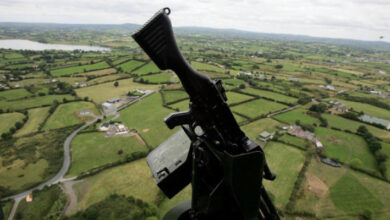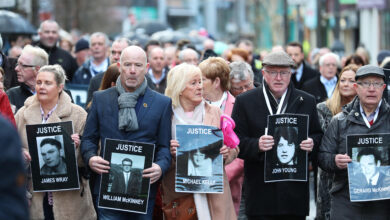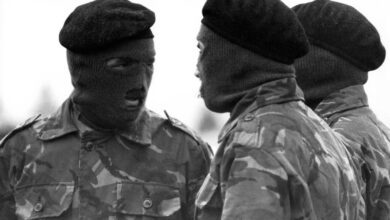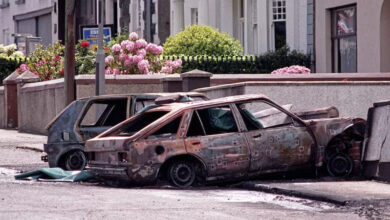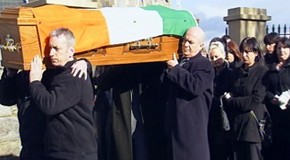Supergrass Trial: archiviate le accuse per 12 imputati
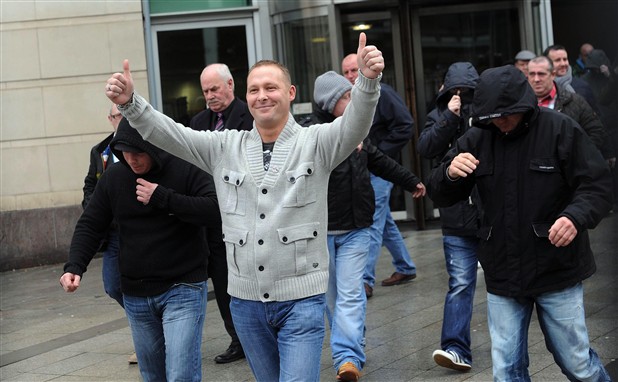
12 cleared of all supergrass charges
Twelve of the 13 defendants in Northern Ireland’s biggest supergrass trial in decades have been found not guilty of all the charges against them – including murder, UVF membership and a litany of associated offences.
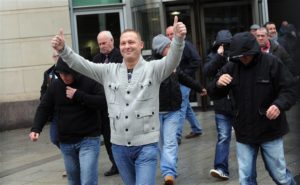 Mount Vernon man Mark Haddock had been accused of being the UVF commander responsible for the loyalist feud murder of rival UDA boss Tommy English in his Newtownabbey home at Halloween in 2000.
Mount Vernon man Mark Haddock had been accused of being the UVF commander responsible for the loyalist feud murder of rival UDA boss Tommy English in his Newtownabbey home at Halloween in 2000.
The prosecution case rested solely on the testimonies of two self-confessed UVF men, who turned Queen’s evidence in return for greatly reduced jail terms.
But after the 21-week trial and three weeks reviewing the evidence, judge Mr Justice John Gillen delivered a damning assessment of the reliability of supergrasses Robert and Ian Stewart.
Describing them as “ruthless criminal and unflinching terrorists”, he said he was not convinced that they had turned over a new leaf and decided to tell the truth.
Instead, Mr Justice Gillen felt their evidence was “infected with lies”.
He told Belfast Crown Court that the pair had “on some occasions, wrongly implicated a number of men who were clearly not present at the crimes suggested” and that they had “at worst falsely embellished or at best wildly confused the roles and words of those whom they alleged were present”.
Referring to Haddock, the judge said that bad character evidence, a propensity towards violence, previous convictions and a UVF tattoo did not necessarily mean he was the UVF commander or organiser of the offences.
Eight other men were accused alongside Haddock of English’s murder, UVF membership and numerous other offences – they were all also cleared of all charges.
“The evidence before me has been too weak and unreliable, based as it was on the flawed and unreliable Stewart testimony,” Mr Justice Gillen said.
“The supporting evidence falls far short of restoring the necessary credibility to satisfy me beyond reasonable doubt as to the guilt of any of the accused on these charges.”
Three men have been cleared of lesser charges, including assisting offenders and perverting the course of justice, while the only man to be convicted – 36-year-old Neil Pollock, from Fortwilliam Gardens in Belfast – was found guilty of possession of a sledgehammer intended for use in terrorism and intending to pervert justice.
In conclusion, the judge did add that ongoing forensic advances and the limited statutory abolition of the rule against double jeopardy may yet ensure that those who committed the crimes at the centre of the trial – including potentially some of those he had just acquitted – will yet face “their just desserts”.
But one man who had been on trial had previously walked free from court, after Mr Justice Gillen ruled last month that he had no case to answer.
And on Tuesday, all the remaining defendants – except Pollock and Haddock, who remain in prison – walked free from the dock.
After exchanging hugs and handshakes, they emerged from the court to be greeted by loud cheers from waiting family and supporters.
The controversial supergrass trial is first of its kind since the 1980s and one of the longest and most expensive in Northern Ireland’s legal history.
In a statement, the Public Prosecution Service defended the decision to proceed with the case, despite the eventual outcome.
“The rejection by the trial judge at the halfway stage of a defence application to stop the trial, and his conclusion that it was conceivable that he could convict the accused, lends support to the view that there was sufficient evidence to proceed with this case,” the statement said.
“This was the view taken by the trial judge after the cross-examination of the principal witnesses.
“However, in order to convict, the court must be satisfied of the guilt of the accused beyond a reasonable doubt – in this case, the judge concluded that the credibility of the principle witnesses was not such as to allow him to be satisfied to that high standard.”
The PSNI said that the judgement did not reduce the merit of “accomplice evidence” and said it would continue to be used as a mechanism to investigate serious and organised crime and terrorism.
“We would urge anyone with information that could help us to come forward and speak to us, in confidence, so that the victims of this ruthless criminal gang and their families can get justice for the terrible crimes committed against them,” a spokesman added.
Supergrass verdict
Supergrass costs

